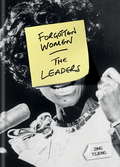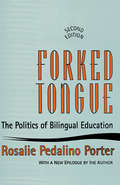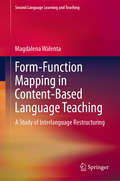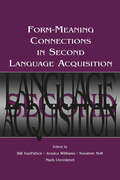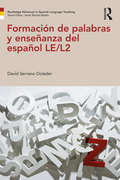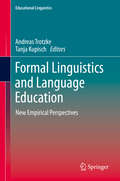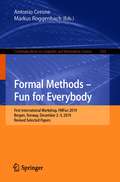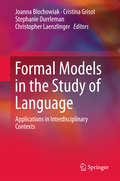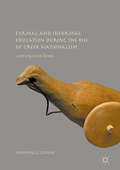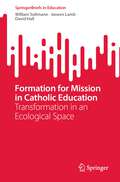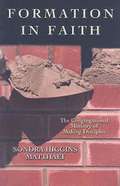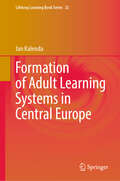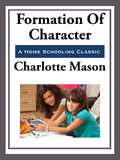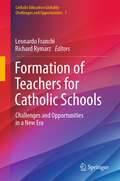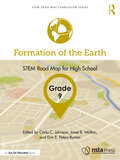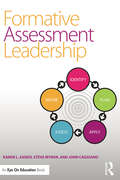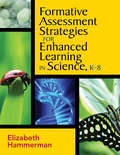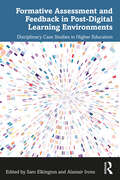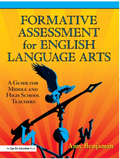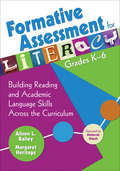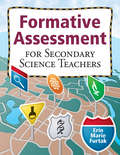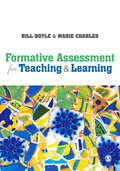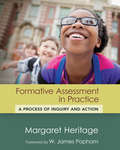- Table View
- List View
Forgotten Women: The Leaders (Forgotten Women)
by Zing TsjengSelected for the Evening Standard present gift guide of the year'To say this series is "empowering" doesn't do it justice. Buy a copy for your daughters, sisters, mums, aunts and nieces - just make sure you buy a copy for your sons, brothers, dads, uncles and nephews, too.' - indy100'Here's to no more forgotten women.' Evening StandardThe women who shaped and were erased from our history.The Forgotten Women series will uncover the lost histories of the influential women who have refused over hundreds of years to accept the hand they've been dealt and, as a result, have formed, shaped and changed the course of our futures. The Leaders weaves together 48* unforgettable portraits of the true pioneers and leaders who made huge yet unacknowledged contributions to history, including:Grace O'Malley, the 16th century Irish pirate queenSylvia Rivera, who spearheaded the modern transgender rights movementAgent 355, the unknown rebel spy who played a pivotal role in the American RevolutionNoor Inayat Khan, who went undercover to spy for the French Resistance and became Nazi enemy no. 1Amina of Zazzau, the formidable ancient Muslim warrior queen of Northern NigeriaChapters including Rebels; Warriors; Rulers; Activists and Reformers shine a spotlight on the rebellious women who defied the odds, and the opposition, to change the world around them. *The number of Nobel-prize-winning women.
Forked Tongue: The Politics of Bilingual Education
by Rosalie PorterToday children who are not fluent in English—legal and illegal immigrants, refugees, and native born—are the fastest growing portion of our population, accounting for more than half the children in classrooms in many city schools. Bilingual education programs established by federal and state laws have required that such students be taught basic subjects in their native languages rather than in English. Judged by most applicable measures—such as achievement scores and dropout rates—these programs have not been successful.This edition includes new material on recent efforts to reform bilingual education, on the growing trend across the country toward English language programs, on the latest national research studies, and on the movement to make English the official language of the United States. Forked Tongue is a devastating inside account of how the twenty-eight-year experiment in bilingual education has failed our language-minority children—and why. Rosalie Porter draws on local, state, and international experience to provide us with the first authoritative account of which policies, programs, and practices actually succeed with the children they are intended to serve. Forked Tongue will be of interest to educators, sociologists, and scholars interested in second language acquisition.
Form-Function Mapping in Content-Based Language Teaching: A Study of Interlanguage Restructuring (Second Language Learning and Teaching)
by Magdalena WalentaThis book presents a form-function mapping (FFM) model for balancing language and content gains within content-based language teaching (CBLT). It includes a theoretical part, which outlines the FFM model and, drawing on the analysis of eclectic teaching methods and interlanguage restructuring, proposes pedagogical tools for its implementation. These tools, which encourage mapping of language forms onto content knowledge, are hypothesized to facilitate interlanguage restructuring, thus helping CBLT learners in their struggle with L2 morpho-syntax. The empirical section presents the results of a quantitative–qualitative study conducted among adult L1 Polish learners of English in a CBLT context. It then goes on to translate the findings, which reveal that the FFM model has a positive and significant influence on interlanguage restructuring as well as a favorable reception among CBLT learners, into a set of pedagogical guidelines for practitioners.
Form-Meaning Connections in Second Language Acquisition (Second Language Acquisition Research Series)
by Jessica Williams Bill VanPatten Susanne Rott Mark OverstreetForm-Meaning Connections in Second Language Acquisition is an interdisciplinary and timely edited book of essays and empirical studies, most of which are based on the papers presented at the Form and Meaning Conference held in Chicago in 2002. The goal of the conference and now of the book is to present linguistic and cognitive approaches to second language acquisition, attempting to integrate external and internal issues in interlanguage development, while outlining directions for future research. The editors address questions, such as: What is the nature and sequence of the form-meaning mapping process? How are these connections made? How are these connections used to construct grammars and lexicons? And, how can conditions and external factors be manipulated to improve the chances of making these form-meaning connections?Contributors to this volume include such second language acquisition scholars as Susan Gass, Nick Ellis, Kathleen Bardovi-Harlig, Catherine Doughty, and Diane Larsen-Freeman. They address these form-meaning issues from a variety of settings and from multiple perspectives.Researchers and graduate students in applied linguistics, cognitive psychology, linguistics, and language pedagogy will find this volume to be an important resource.
Formación de palabras y enseñanza del español LE/L2 (Routledge Advances in Spanish Language Teaching)
by David Serrano-DoladerFormación de palabras y enseñanza del español LE/L2 offers a unique combination of theory and practice that guides the reader through the main processes of word formation in Spanish. It provides a detailed analysis of the role of lexical creation in the acquisition of L2 Spanish vocabulary, as well as over a hundred practical self-reflection activities. Key features: • Comprehensive theoretical explanations of word formation, including theoretical and pedagogical principles and their implementation in the teaching of L2 Spanish; • Step-by-step pedagogical introductions to the full range of lexical creation mechanisms in Spanish language, including prefixation, emotive and nonemotive suffixation and composition; • Carefully-chosen lists of relevant issues on lexical morphology with immediate applicability to the teaching of L2 Spanish; • Guided activities with an answer key, which helps the reader to connect theory with practice and to become familiar with the key aspects of Spanish lexical morphology; • Guidelines on how to tackle the teaching of Spanish word formation and vocabulary in an effective and engaging way. Written in a clear and accessible manner, Formación de palabras y enseñanza del español LE/L2 is an essential resource for teachers of Spanish at all levels. It is also an excellent reference book for language teachers who wish to integrate word formation into the teaching of the Spanish language.
Formal Linguistics and Language Education: New Empirical Perspectives (Educational Linguistics #43)
by Tanja Kupisch Andreas TrotzkeThis volume focuses on work that has its origin and motivation in formal linguistics and theory-driven research on the acquisition of grammar, and on this basis tries to establish links to language pedagogy, including students’ and teachers’ beliefs about what ‘grammar’ actually is. The contributions to this volume cover a wide range of empirical linguistic domains and concern aspects of morphosyntax, including word order, inflectional morphology, article systems, pronouns, compounding patterns, as well as orthography and students’ general beliefs about grammar."There are very few volumes which include work for language education by researchers in formal linguistics. This volume does just that, looking at grammar both in terms of the teaching of grammar in general, and with treatment of specific areas of grammar. As such it is a welcome contribution to our understanding of language education, and the role of grammar in language teaching." (Melinda Whong, The Hong Kong University of Science and Technology, Hong Kong)
Formal Methods – Fun for Everybody: First International Workshop, FMFun 2019, Bergen, Norway, December 2–3, 2019, Revised Selected Papers (Communications in Computer and Information Science #1301)
by Antonio Cerone Markus RoggenbachThis volume constitutes the post-workshop proceedings of the First International Workshop on Formal Methods – Fun for Everybody, FMFun 2019, held in Bergen, Norway, in December 2019.The 7 revised full papers and 2 revised short papers presented in this volume were carefully reviewed and selected from 15 submissions. A white paper and two keynote papers are also included. The papers explore ways of utilizing the pathway to transforming and spreading formal methods. The vision of this workshop series is that formal methods ought to be taught in such a way that every student can have fun with it.
Formal Models in the Study of Language
by Joanna Blochowiak Cristina Grisot Stephanie Durrleman Christopher LaenzlingerThis volume presents articles that focus on the application of formal models in the study of language in a variety of innovative ways, and is dedicated to Jacques Moeschler, professor at University of Geneva, to mark the occasion of his 60th birthday. The contributions, by seasoned and budding linguists of all different linguistic backgrounds, reflect Jacques Moeschler's diverse and visionary research over the years. The book contains three parts. The first part shows how different formal models can be applied to the analysis of such diverse problems as the syntax, semantics and pragmatics of tense, aspect and deictic expressions, syntax and pragmatics of quantifiers and semantics and pragmatics of connectives and negation. The second part presents the application of formal models to the treatment of cognitive issues related to the use of language, and in particular, demonstrating cognitive accounts of different types of human interactions, the context in utterance interpretation (salience, inferential comprehension processes), figurative uses of language (irony pretence), the role of syntax in Theory of Mind in autism and the analysis of the aesthetics of nature. Finally, the third part addresses computational and corpus-based approaches to natural language for investigating language variation, language universals and discourse related issues. This volume will be of great interest to syntacticians, pragmaticians, computer scientists, semanticians and psycholinguists.
Formal and Informal Education during the Rise of Greek Nationalism
by Theodore G. ZervasThis book examines informal modes of learning in Greece from in the late nineteenth and early twentieth centuries, set against the backdrop of Greek nationalist interests and agendas. For much of this period, one of the Greek state's major goals was to bind the nation around a common history and culture, linked to a collective and homogenous community. This study addresses the critical relationship between the average Greek child and their home, community, and school life during the earliest stages of their education. The stories, games, songs, and theater that children learned in Greece for much of the late nineteenth and early twentieth centuries went beyond shaping their moral character or providing entertainment, but were instrumental in forging a Greek national consciousness.
Formation for Mission in Catholic Education: Transformation in an Ecological Space (SpringerBriefs in Education)
by David Hall William Sultmann Janeen LambThis book arose from commissioned research by the National Catholic Education Commission (NCEC) on the alignment and effectiveness of 'A Framework for Formation for Mission in Catholic Education' (NCEC, 2017). It articulates contemporary best practice, and traces the experience of the Catholic Church in pursuing formation as integral to mission. This book also reviews and reports on formation within the context of the Catholic school. Its research validates ‘The Framework’ in Catholic education, and provides a complementary narrative for enhancing formation alignment and effectiveness, specifically with a focus on the Catholic school, but also with implications for formation in the wider context of ministry applications.This book is developed based on three questions, which also serve as thematic chapters that structure the narrative: what is the context and culture in which formation occurs; how is formation presented and enacted within the Australian context; and how can the understanding and practice of formation be advanced beyond its context and culture, policy, programs and ‘The Framework’ principles.
Formation in Faith: The Congregational Ministry of Making Disciples
by Sondra Higgins MatthaeiThe ministry of congregations is to make disciples of Jesus Christ. Behind that simple and seemingly self-evident statement lies a problematic reality, however. While congregations know that disciple making is at the heart of their identity, they often have trouble understanding how to go about it. Apart from such traditional Christian education ministries as Sunday school, too little formal thinking or planning goes into the task of forming Christians in the faith. In this book Sondra Matthaei casts a vision in which congregations open up their life of faith to others as an invitation to connect the universal longing for authentic relationships and deeper meaning with the church’s practice of faithful discipleship. As folks enter the church’s communion of grace, Matthaei challenges church leaders to utilize the gifts of every member and lays out a plan to help congregations grow in faith and communion with God and creation, including the context and goal of such ministry, deciding what to teach and who shall teach, and attendant relationships, structures, and practices.
Formation of Adult Learning Systems in Central Europe (Lifelong Learning Book Series #32)
by Jan KalendaThis book explores the formation and development of the cross-national patterns of adult learning systems between 1989 and 2019 in four Central European countries: the Czech Republic, Slovakia, Hungary and Poland. Drawing on the approach of the political economy of adult education and historical institutionalism, the book closely examines (1) how the institutional settings in these countries have formed, evolved and contributed to overall participation in adult education and training, (2) how they have shaped patterns of participation and unequal chances to be involved in this social activity, as well as (3) perceived barriers to access organized learning and related governmental policies. This book offers a contemporary overview of key findings regarding adult learning systems. It delves into the factors that influence participation in adult education and training. Through the utilization of the novel framework, GALS (Global Adult Learning Space), the book not only highlights a crucial distinction among adult learning systems within the region but also presents in-depth case studies of these systems in Poland, the Czech Republic, Hungary, and Slovakia spanning a 30-year period. Despite these countries sharing similar institutional backgrounds and societal challenges, the book reveals that their adult learning systems have undergone divergent trajectories over the past three decades. This book will be useful to researchers and scholars in the fields of adult education, comparative education, welfare policy, sociology of education, and European studies.
Formation of Character
by Charlotte MasonFormation of Character is the fifth volume of Charlotte Mason's Homeschooling series. The chapters stand alone and are valuable to parents of children of all ages. Part I includes case studies of children (and adults) who cured themselves of bad habits. Part II is a series of reflections on subjects including both schooling and vacations (or "stay-cations" as we now call them). Part III covers various aspects of home schooling, with a special section detailing the things that Charlotte Mason thought were important to teach to girls in particular. Part IV consists of examples of how education affected outcome of character in famous writers of her day. Charlotte Mason was a late nineteenth-century British educator whose ideas were far ahead of her time. She believed that children are born persons worthy of respect, rather than blank slates, and that it was better to feed their growing minds with living literature and vital ideas and knowledge, rather than dry facts and knowledge filtered and pre-digested by the teacher. Her method of education, still used by some private schools and many homeschooling families, is gentle and flexible, especially with younger children, and includes first-hand exposure to great and noble ideas through books in each school subject, conveying wonder and arousing curiosity, and through reflection upon great art, music, and poetry; nature observation as the primary means of early science teaching; use of manipulatives and real-life application to understand mathematical concepts and learning to reason, rather than rote memorization and working endless sums; and an emphasis on character and on cultivating and maintaining good personal habits. Schooling is teacher-directed, not child-led, but school time should be short enough to allow students free time to play and to pursue their own worthy interests such as handicrafts. Traditional Charlotte Mason schooling is firmly based on Christianity, although the method is also used successfully by s
Formation of Teachers for Catholic Schools: Challenges and Opportunities in a New Era (Catholic Education Globally: Challenges and Opportunities #1)
by Richard Rymarz Leonardo FranchiThis book explores in a theoretical and practical sense the challenges and opportunities arising in the initial and ongoing formation processes for teachers in Catholic schools. It showcases a range of international perspectives on how prospective teachers for Catholic schools are prepared both academically and pastorally for their professional role. Divided into two parts, Part 1 of the book focuses on certain countries in the Anglosphere; each country with a dedicated chapter in which the academic and pastoral approaches to teacher formation are examined in the context of its particular cultural, political and religious landscape. Part 2 of the book examines specific areas of interest with particular reference to what it means for the Catholic Church’s mission to offer suitable formation to its corps of teachers. Building on the editors' previous work, this book offers a fresh perspective on this subject by bringing together observations from selected local contexts on what Catholic teacher formation looks like as a set of organised processed and structures. It also shows how the study of educational themes offers challenges to current practices, but also opportunities for fruitful engagement with other educational perspectives.
Formation of the Earth, Grade 9: STEM Road Map for High School (STEM Road Map Curriculum Series)
by Carla C. Johnson Erin E. Peters-Burton Janet B. WaltonWhat if you could challenge your ninth graders to use geologic theory and standards of measurement to explore different epochs and time periods of the Earth’s formation? With this volume in the STEM Road Map Curriculum Series, you can! Formation of the Earth outlines a journey that will steer your students toward authentic problem solving while grounding them in integrated STEM disciplines. Like the other volumes in the series, this book is designed to meet the growing need to infuse real-world learning into K–12 classrooms. This interdisciplinary, three-lesson module uses project- and problem-based learning to help students investigate how Earth science professionals gather information and develop theories about the formation of the Earth and the processes taking place since the proliferation of humans. Working in teams, students will work to identify, define and describe the attributes scientists use to delineate Earth’s eras, periods, and epochs, in order to determine the appropriate boundary event to define the Anthropocene Epoch, and will develop a publication-ready textbook entry for an Earth science textbook. To support this goal, students will do the following: • Identify, define, and describe attributes of eras, periods, and epochs which have marked geologic time in Earth’s history. • Evaluate various possible index layers and boundary events that mark the beginning of the Anthropocene Epoch to determine which is most appropriate when labeling the current epoch in Earth’s history. • Design and present a multimedia presentation to share with textbook publishers regarding information on the Anthropocene Epoch, to include in a secondary-level Earth science textbook. • Create a publication-ready textbook entry describing the Anthropocene Epoch. The STEM Road Map Curriculum Series is anchored in the Next Generation Science Standards, the Common Core State Standards, and the Framework for 21st Century Learning. In-depth and flexible, Formation of the Earth can be used as a whole unit or in part to meet the needs of districts, schools, and teachers who are charting a course toward an integrated STEM approach.
Formation organisationspädagogischer Erkenntnis (Organisation und Pädagogik #35)
by Tamara DiederichsWissenschaftlichen Erkenntnissen wird in der heutigen Gesellschaft ein bedeutsamer Stellenwert zugeschrieben. Insbesondere vor dem Hintergrund einer zunehmenden Pluralisierung von Wissen und Erkenntnis scheint es notwendig zu sein, sich mit der Wissenschaft und der Produktion ihrer Erkenntnisse auch aus einer wissenschaftsreflexiven Perspektive zu beschäftigen. Die "Formation organisationspädagogischer Erkenntnis" schließt an diese Notwendigkeit an und liefert einen Beitrag zur Rekonstruktion (erziehungs-)wissenschaftlicher Erkenntnisproduktion am Beispiel pädagogischer Organisationsforschung, indem der Frage nachgegangen wird, welche Bedingungen der Möglichkeit Erkenntnisinteressen in einem institutionalisierten Teildiskurs pädagogischer Organisationsforschung formieren
Formative Assessment Leadership: Identify, Plan, Apply, Assess, Refine
by Karen L. Sanzo Steve Myran John CaggianoThis exciting new book is for school leaders who are interested in transforming their school and district practices. Discussing issues that impact students, teachers within their classrooms, and the larger school community, Formative Assessment Leadership explores how leaders can implement effective professional development and positive change in their schools. Breaking down formative assessment into manageable, understandable parts, the authors provide: An exploration of what formative data-based decision making looks like Scaffolding that enables school leaders to effectively integrate processes into their own school structure Discussion of potential barriers to success and how to overcome these challenges Practical examples that help ground the formative assessment leadership concepts A range of worksheets and templates to help implement formative assessment leadership in your schools
Formative Assessment Strategies for Enhanced Learning in Science, K-8
by Elizabeth HammermanUse formative assessment to guide successful teaching and learning in science! Outlining the formative assessment process and providing strategies for embedding assessment into the K–8 standards-based science curriculum, this essential resource demonstrates how teachers can use formative assessments to modify instruction, monitor student progress, and evaluate learning. This user-friendly guide offers teachers discussions, reflection activities, and classroom strategies to: Assess student understanding using observation checklists, questioning strategies, notebooks, reports, graphic organizers, projects, and performance tasks Differentiate science instruction to reach all learners Use rubrics to uncover student strengths and weaknesses Collect student data to inform instructional decisions
Formative Assessment and Feedback in Post-Digital Learning Environments: Disciplinary Case Studies in Higher Education
by Sam Elkington Alastair IronsThis fundamental text provides cutting-edge theory and practical insights into how formative assessment and feedback can be used enhance student learning development through exploring an exciting range of case studies from experts in the field.Underpinned by relevant theory and real-world advice spanning the global higher education sector, this book examines the importance of technology and digital education in shaping the use of assessment and feedback in higher education. Presented through international perspectives in assessment research and practice across a broad array of subject disciplines, the book focuses on the inclusion of empirical evidence, as well as the contemporary issues and challenges currently facing formative assessment. The case studies bring to life strategies and approaches that utilise a combination of digital and material tools to promote a range of innovative formative assessment practices, including facilitating dialogic formative assessment and supporting peer review and co-production of feedback artefacts. Each case study is divided into the context behind it, the strategy, practice, impact, and key learning outcomes, presenting a series of opportunities for practitioners to consider and embed in their practice.Aimed at experienced and early career practitioners in higher education, as well as third space practitioners such as learning and educational developers and designer, this text is ideal reading for educators who wish to see evolution in higher education, using the lessons learned from utilising educational technology to focus on student learning in increasingly digital environments.
Formative Assessment for English Language Arts: A Guide for Middle and High School Teachers
by Amy BenjaminThis book demonstrates how formative assessments, unlike standardized tests, provide the kind of communication between teachers and students that help teachers make instructional decisions to improve student performance.
Formative Assessment for Literacy, Grades K-6: Building Reading and Academic Language Skills Across the Curriculum
by Margaret Heritage Dr Alison L. BaileyGrounded in research and practice, this resource shows elementary teachers how to use formative assessment to build students' language and literacy skills across the curriculum.
Formative Assessment for Secondary Science Teachers
by Professor Erin Marie FurtakCovering physics/physical science, life science/biology, earth and space science, and chemistry, this research-based guide shows secondary teachers how to develop and use formative assessments to enhance learning in science.
Formative Assessment for Teaching and Learning
by Marie Charles Bill Boyle'A unique blend of scholarly research-based principles of effective formative assessment with practical suggestions for use in the classroom. The authors show how the essence of formative assessment is in teachers' responses to the substance students' understandings, with a focus on how teachers can use pedagogical strategies to move students forward toward important learning outcomes. I highly recommend the book for both researchers and practitioners. It is an engaging, in-depth, sophisticated treatment of formative assessment.' - James H. McMillan, Virginia Commonwealth University Formative Assessment (AFL) supplies the strategy to support effective teaching, and to make learning deep and sustained. This book shows how to develop your planning for learner-centred day-to-day teaching and learning situations through an understanding of formative teaching, learning and assessment. Within each chapter, based on real teaching situations, the strategies of the 'formative assessment toolkit' are identified and analysed: guided group teaching differentiation observation & evidence elicitation analysis & feedback co-construction reflective planning self-regulation dialogue & dialogic strategies. The principles set out in this book can be applied to any age or stage in education, but will be particularly useful to current practising teachers, students following international and national teacher training courses; CPD or in-service work; and MEd and MA post-graduate assessment/teaching and learning modules.
Formative Assessment in Practice: A Process of Inquiry and Action
by W. James Popham Margaret HeritageMargaret Heritage presents a practical guide to formative assessment as a process of "inquiry and action" essential to twenty-first century learning. In the wake of the development of the Common Core standards and the effort to develop the appropriate assessments to accompany them, formative assessment has attracted increasing attention from policy makers and practitioners alike. Yet this powerful and promising approach is often applied in ways that fail to capture its potential for improving student learning. In her book, Margaret Heritage presents a practical guide to formative assessment as a process of "inquiry and action" essential to twenty-first century learning. Heritage's approach is distinctive in that it is grounded in a "children's rights" framework--that is, the belief that assessment should be in the best interest of all students, that students should be involved in the decisions that ensue from assessment use, and that opportunities to learn, progress, and succeed will be available to all children equally. Accordingly, she addresses the students' own role in learning about themselves as learners and examines the classroom as a community of practice. The book also includes chapters on learning progressions and the policy contexts that support formative assessment. Skillfully interweaving theory and practice, this book promises to be an invaluable resource for teachers, teacher educators, and those interested in the academic and policy aspects of assessment.
Formative Assessment in Practice: A Process of Inquiry and Action (Assessment, Accountability, & Achievement Series)
by Margaret HeritageMargaret Heritage presents a practical guide to formative assessment as a process of &“inquiry and action&” essential to twenty-first century learning. In the wake of the development of the Common Core standards and the effort to develop the appropriate assessments to accompany them, formative assessment has attracted increasing attention from policy makers and practitioners alike. Yet this powerful and promising approach is often applied in ways that fail to capture its potential for improving student learning. In her book, Margaret Heritage presents a practical guide to formative assessment as a process of &“inquiry and action&” essential to twenty-first century learning. Heritage&’s approach is distinctive in that it is grounded in a &“children&’s rights&” framework—that is, the belief that assessment should be in the best interest of all students, that students should be involved in the decisions that ensue from assessment use, and that opportunities to learn, progress, and succeed will be available to all children equally. Accordingly, she addresses the students&’ own role in learning about themselves as learners and examines the classroom as a community of practice. The book also includes chapters on learning progressions and the policy contexts that support formative assessment. Skillfully interweaving theory and practice, this book promises to be an invaluable resource for teachers, teacher educators, and those interested in the academic and policy aspects of assessment.
